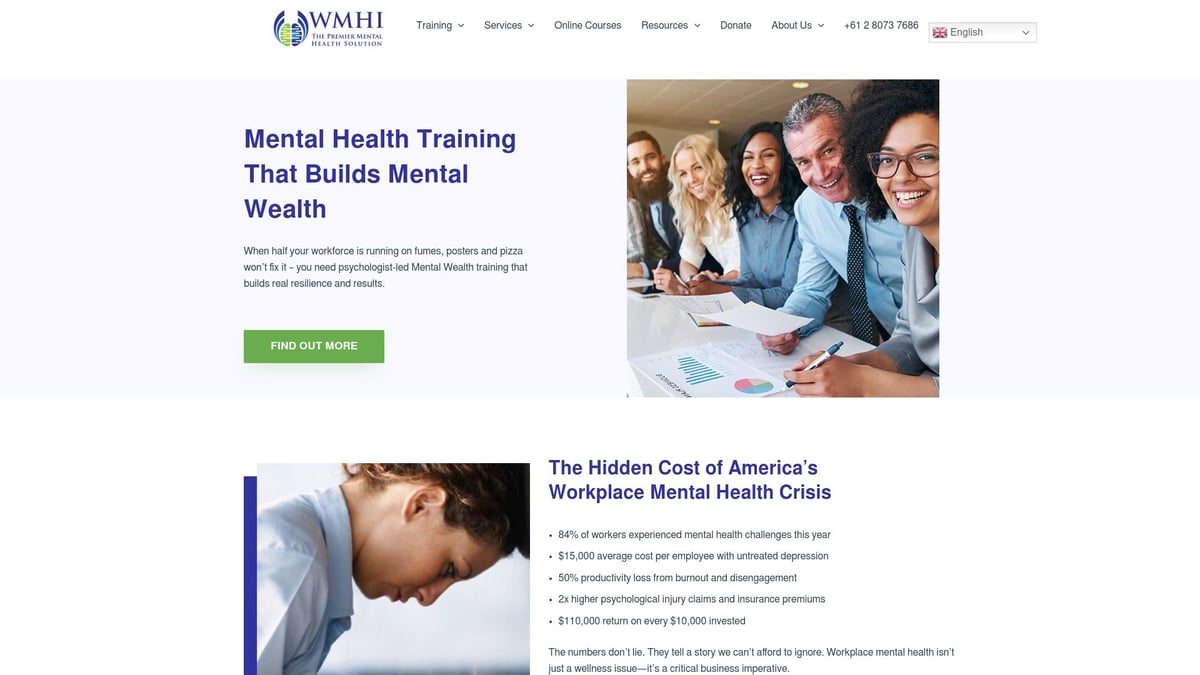Mental health awareness is reshaping Australian workplaces and communities, with more people than ever recognising the importance of wellbeing. In 2025, understanding mental health days australia is essential for both employees and employers navigating new expectations and legal changes.
This guide will clarify what mental health days are, why they matter, and how they differ from traditional leave. You will learn about updated laws, practical steps for taking a day when needed, and what organizations are doing to support staff. Ready to stay ahead of the curve? Let’s explore how to make the most of mental health days in australia this year.
Understanding Mental Health Days in Australia
Taking time off for your mental wellbeing is no longer viewed as an exception in Australia. Instead, mental health days australia are now a recognised and essential part of workplace and community culture. But what exactly constitutes a mental health day, and how does it differ from traditional sick leave?

Defining Mental Health Days
A mental health day is a day taken off work or school specifically to focus on emotional wellbeing, reduce stress, and recover from psychological strain. Unlike traditional sick leave, which typically addresses physical illness, mental health days australia acknowledge the importance of psychological health. These days are used proactively, often before stress escalates to more serious issues.
The Evolution of Mental Health Days in Australia
Over the past decade, the conversation around mental health has shifted dramatically. Initially, taking time off for mental health was rarely discussed, with many fearing stigma or job insecurity. However, as awareness has grown, so has acceptance. High-profile campaigns and advocacy from organizations like Beyond Blue and the Black Dog Institute have played a pivotal role. Today, more Australians feel empowered to request mental health days australia without fear of judgment.
Why Mental Health Days Matter
Taking mental health days australia can help individuals reduce burnout, boost productivity, and support long-term recovery. When stress, anxiety, or depression go unaddressed, performance at work and relationships at home can suffer. By taking proactive steps, Australians are better equipped to maintain balance and resilience.
Societal Impact and Key Statistics
Greater acceptance of mental health days australia is driving cultural change. Open conversations in workplaces and schools are helping to de-stigmatize mental health struggles. According to Mental Health Statistics in Australia, 1 in 5 Australians experience a mental health issue each year, highlighting the widespread need for support. Increased use of mental health leave is a sign that more people are prioritizing wellbeing.
Debunking Common Myths
Despite growing acceptance, several myths persist. Some believe mental health days australia are simply an excuse for extra time off. In reality, these days are vital for early intervention and preventing longer-term issues. Others think only those with diagnosed conditions need them, but anyone can benefit from a day to reset and recharge.
Corporate Leaders and Advocacy
Major Australian companies such as Telstra and the Commonwealth Bank now offer dedicated mental health leave policies. These organizations recognize that supporting mental health days australia leads to higher employee satisfaction and lower turnover. Advocacy groups continue to educate employers and employees alike, ensuring mental health support is available to all Australians.
By understanding the purpose and importance of mental health days australia, individuals and organizations can foster healthier, more supportive environments for everyone.
Legal Rights and Policies for Mental Health Days (2025 Update)
Australia’s approach to workplace wellbeing is evolving rapidly, with mental health days australia now recognised as a fundamental aspect of employee rights. Understanding the laws and policies behind these days is essential for both employers and workers. Let’s break down the latest legal landscape, rights, and processes shaping mental health days in australia for 2025.

Overview of Australian Employment Law and Mental Health
The legal framework for mental health days australia is anchored in the Fair Work Act 2009. This legislation recognises mental health as a valid reason for personal leave, treating it with the same seriousness as physical illness. In 2025, amendments have clarified that employees can access their paid personal leave for mental health reasons, not just physical ailments.
It is important to note the distinctions between mental health leave, traditional sick leave, and carers’ leave. Mental health days australia are now explicitly covered under personal leave, while carers’ leave supports those caring for someone with a mental health condition. These updates ensure that mental wellbeing is protected under the same rights as physical health, reflecting a broader shift in workplace expectations.
Recent data also highlights the scale of the issue, with a significant rise in psychological claims and absences reported in Key Work Health and Safety Statistics Australia 2025, reinforcing the importance of these legal provisions.
Employer Obligations and Employee Rights
Employers across Australia are legally required to accommodate mental health days australia, offering a safe and supportive environment. Under the Fair Work Act and state-based anti-discrimination laws, employees are protected from adverse action or discrimination when taking leave for mental health reasons.
Confidentiality is paramount. Employers must keep any disclosures about mental health private, sharing information only with consent or when legally necessary. Employees have the right to request adjustments or flexible work arrangements if their mental health requires it, and employers must reasonably consider these requests.
Legal precedents set by the Fair Work Commission have clarified employer obligations. For example, companies that failed to acknowledge legitimate mental health days australia have faced penalties and adverse rulings. The Fair Work Ombudsman regularly issues guidance on best practices, reminding employers of their duty to support staff.
Policies can vary by state and territory. For instance, Victoria and New South Wales have additional mental health protections under their work health and safety legislation. Employers should familiarise themselves with both federal and local requirements to ensure full compliance and foster a culture of support.
Navigating Documentation and Processes
When taking mental health days australia, employees may wonder about medical certificates or evidence. In most cases, employers can request reasonable evidence, such as a doctor’s certificate or statutory declaration, to support the absence. However, the law does not require employees to disclose specific details about their mental health condition.
Open communication is key. Employees should notify their manager or HR department as soon as possible, using clear and respectful language. For example, a simple script might be: “I am unwell and need to take personal leave today.” This approach maintains privacy while meeting legal notification requirements.
Concerns about job security or stigma are common. It helps to know that mental health days australia are protected by law, and employers cannot take disciplinary action against staff for using their entitled leave. If issues arise, employees can seek guidance from the Fair Work Ombudsman or workplace advocacy groups for confidential support.
Notable Policy Changes for 2025
The year 2025 brings several notable changes affecting mental health days australia. The federal government is piloting new mental health leave initiatives in high-risk sectors like healthcare, education, and mining. These pilots aim to provide additional paid days and targeted support for frontline workers.
Recent surveys show a sharp increase in workplaces formalising mental health leave policies, reflecting a national commitment to psychological safety. Industry associations are also updating their guidelines to align with evolving best practices.
Together, these changes signal a future where mental health days australia are a standard part of employment, helping to reduce stigma and promote long-term wellbeing for all Australians.
How to Take a Mental Health Day: Step-by-Step Guide
Taking mental health days australia is a proactive and vital step for maintaining wellbeing at work. Knowing when and how to take these days can make a significant difference to your mental health and overall productivity. The following step-by-step guide walks you through the process, from recognizing your needs to returning to work with confidence.
Recognizing When You Need a Mental Health Day
Understanding when to take a break is the first step. Common signs indicating you may need mental health days australia include persistent fatigue, difficulty concentrating, irritability, or feeling overwhelmed by small tasks.
Self-assessment tools and mental health checklists provided by organizations such as Beyond Blue can be valuable. These tools help you identify symptoms of burnout, anxiety, or depression early. For example, an employee who notices they are withdrawing from team interactions or feeling anxious about upcoming meetings might realize it is time to pause and recharge.
It is important to remember that burnout is a leading reason for mental health days australia. If you are unsure whether your symptoms point to burnout, consider reviewing resources like Preventing and Managing Burnout for guidance.
Planning and Requesting Your Mental Health Day
Once you recognize the need, planning your mental health days australia is crucial. Choose a time that minimizes disruption to your work and consider upcoming deadlines or team responsibilities.
When requesting leave, use clear and respectful communication. You can send a simple email or speak directly with your manager or HR. Here is a sample email template:
Subject: Request for Personal Leave
Hi [Manager’s Name],
I would like to request a personal day to focus on my wellbeing. Please let me know if you need any further information.
Thank you,
[Your Name]
Navigating workplace culture can be challenging. If you are concerned about stigma, remember that more Australian workplaces are normalizing mental health days australia. Open conversations are becoming the norm.
Making the Most of Your Mental Health Day
Maximizing the benefits of mental health days australia means choosing restorative activities. Rest is essential, but so is engaging in activities that support your recovery, such as therapy sessions, gentle exercise, mindfulness meditation, or spending time outdoors.
Mental health professionals recommend creating a simple routine for your day. For example:
- Morning: Sleep in, have a healthy breakfast
- Midday: Attend a therapy session or practice mindfulness
- Afternoon: Take a walk or do light exercise
- Evening: Reflect on your feelings and prepare for the next day
Avoid checking work emails or feeling guilty for taking time off. Remember, mental health days australia are designed for your recovery, not for catching up on work or isolating yourself from support.
Returning to Work After a Mental Health Day
Transitioning back to work after mental health days australia can be smooth with the right strategies. Start by reviewing your workload and setting realistic expectations for your first day back.
Communicate openly with your manager if you need adjustments or a phased return. If you feel comfortable, let colleagues know you are available but still focusing on your wellbeing.
Taking mental health days australia should not lead to extra stress. Use this time to reset and return to your role with renewed energy and perspective.
Addressing Potential Barriers
Several barriers can make it difficult to take mental health days australia. Internal resistance, such as guilt or fear of judgment, is common. Remind yourself that these days are your legal right and contribute to your long-term health.
If your workplace is unsupportive, seek guidance from HR or consult advocacy groups like Beyond Blue. You can also access confidential support services for advice on your rights and options concerning mental health days australia.
Workplace Mental Health Institute: Training for a Supportive Workplace
Comprehensive workplace training through the Workplace Mental Health Institute empowers both managers and employees to support mental health days australia. Evidence-based programs have been shown to reduce absenteeism and stigma, making it easier for staff to take the time they need.

Organizations that invest in these programs report higher employee satisfaction and fewer psychological injury claims. By fostering a culture where mental health days australia are normalized, workplaces become safer, healthier, and more productive for everyone.
Best Practices for Workplaces: Creating a Mental Health-Friendly Culture
Building a truly supportive environment for mental health days australia requires more than just policy updates. It demands a shift in workplace culture, leadership attitudes, and daily practices. Organizations that prioritize these best practices are better equipped to foster resilience, reduce absenteeism, and promote long-term wellbeing.

1. Leadership Buy-In and Visible Support
Genuine change starts at the top. When senior leaders openly champion mental health days australia, it sends a powerful message that employee wellbeing is a priority. Leaders should model healthy behaviors, such as taking mental health leave themselves when needed, and encourage others to do the same. This visibility breaks down stigma and empowers staff to access support without fear.
2. Develop Clear, Accessible Policies
Transparent, well-communicated policies are vital to normalize mental health days australia. Policies should outline eligibility, request procedures, confidentiality protections, and support resources. Make these policies easily accessible, using simple language and inclusive examples so that every employee understands their rights and options.
3. Train Managers to Recognize and Respond
Managers are often the first point of contact when staff need support. Equip them with training to spot signs of stress or burnout, initiate sensitive conversations, and respond appropriately. Incorporating Building Psychological Safety at Work into training programs helps managers create environments where employees feel safe to request mental health days australia without fear of judgment.
4. Offer Flexibility and Reasonable Adjustments
Flexible work options, such as remote work, adapted hours, or gradual return-to-work plans, can make a significant difference for those needing mental health days australia. Employers should be proactive in offering reasonable adjustments, collaborating with employees to find solutions that balance individual needs and operational requirements.
5. Promote Open Conversations and Peer Support
Encouraging open dialogue about mental health reduces stigma and fosters trust. Regular wellbeing check-ins, peer support groups, and mental health awareness campaigns can help normalize conversations about mental health days australia. Empower staff to support one another and share resources, creating a sense of community and belonging.
6. Monitor and Measure Workplace Wellbeing
Ongoing assessment is key to ensuring best practices are effective. Use anonymous surveys, focus groups, and wellbeing metrics to monitor the impact of mental health days australia policies. Act on feedback, adjust programs as needed, and celebrate progress to reinforce a culture of continuous improvement.
7. Recognize Exemplary Organizations and Results
Australian companies like Woolworths and Westpac have been recognized for their outstanding mental health initiatives. Workplaces with a strong culture supporting mental health days australia report 33% less absenteeism, according to Safe Work Australia. These results highlight the tangible benefits of investing in a mentally healthy workplace.
Fostering a culture that values mental health days australia is not just a legal or ethical responsibility—it is a business imperative. By prioritizing leadership, policy clarity, training, flexibility, conversation, measurement, and recognition, organizations can create environments where everyone thrives.
Supporting Others: How to Encourage and Respect Mental Health Days
Supporting colleagues who take mental health days australia is vital for building a compassionate workplace, especially as awareness grows. With 1 in 5 Australians experiencing mental health challenges each year, understanding how to assist others during mental health leave is a crucial skill for every team member.
Recognizing the Need for Support
Pay attention to subtle changes in your colleagues’ behavior, such as withdrawal from team activities, increased irritability, or declining performance. These may signal that someone could benefit from mental health days australia. Sometimes, signs are less obvious, like missed deadlines or frequent absences. If you notice a colleague struggling, consider gently checking in.
Approaching Conversations with Empathy
When you approach a colleague, prioritize privacy and genuine concern. Use open questions like, "How are you feeling lately?" or "Is there anything I can do to help?" For guidance on supportive dialogue, the Mental Health and Wellbeing Conversations resource offers proven strategies for starting empathetic discussions and normalizing mental health days australia in the workplace.
Encouraging and Respecting Mental Health Leave
Encourage team members to take mental health days australia without fear of judgment or stigma. Reinforce that prioritizing mental wellbeing is as important as physical health. If someone expresses hesitation, remind them that mental health leave is a right, and reassure them of your respect for their privacy and choices. A supportive attitude helps break down barriers and promotes a healthier workplace culture.
Role of HR and Wellbeing Coordinators
HR professionals and wellbeing coordinators are essential in creating environments where mental health days australia are respected. They should implement clear policies, maintain confidentiality, and support both employees and managers in navigating mental health leave. Regular communication about available support services and training can increase confidence across the team.
Accessing Resources and Building Peer Support
If you are unsure how to help, direct colleagues to professional resources such as Lifeline or Beyond Blue. Encourage involvement in peer support programs or workplace mental health initiatives. By fostering open dialogue and respecting mental health days australia, you contribute to a culture where everyone feels safe to seek help when needed.
Resources and Tools for Mental Health Days in Australia (2025)
Access to reliable resources has never been more important for those navigating mental health days australia. With the growing recognition of mental health in workplaces and communities, a wealth of tools, services, and support options are now available to help Australians take proactive steps toward wellbeing.
National Support Services and Helplines
If you are planning to take mental health days australia, it is crucial to know where to turn for immediate help. National helplines such as Lifeline (13 11 14), Beyond Blue (1300 22 4636), and the Suicide Call Back Service (1300 659 467) offer confidential support 24/7.
For digital-first options, Head to Health connects people with online mental health resources, guided self-help, and local support. These services ensure that anyone taking mental health days australia can access advice, crisis intervention, or ongoing counseling whenever needed.
Top Helplines and Services Table
| Service | Contact | Focus Area |
|---|---|---|
| Lifeline | 13 11 14 | Crisis support, suicide prevention |
| Beyond Blue | 1300 22 4636 | General mental health support |
| Head to Health | Online | Digital resources, self-help |
| Suicide Call Back Service | 1300 659 467 | Crisis counseling |
Digital Tools and Apps
Technology is making it easier than ever to support mental health days australia. Apps like Smiling Mind, Calm, and Headspace provide guided meditation, stress reduction techniques, and daily check-ins.
Many Australians use these digital tools to track mood, set reminders for self-care, and access mindfulness exercises during their mental health days australia. For those preferring structured programs, the Black Dog Institute offers MyCompass, a free online tool for managing symptoms of anxiety and depression.
Recommended Apps:
- Smiling Mind (free, Australian-developed)
- Headspace (guided meditation)
- MoodMission (evidence-based strategies)
- MyCompass (personalized self-help)
Online Training and Courses
Building skills and resilience is key for effective mental health days australia. Training platforms such as WMHI Online Courses provide evidence-based modules on stress management, emotional regulation, and workplace wellbeing.
Organizations can also access tailored training to help teams understand and support mental health days australia. Many courses are self-paced and accessible from anywhere, making it easy for individuals and workplaces to integrate learning into their schedules.
For those looking for comprehensive programs, the Workplace Mental Health Institute offers a range of options for both employees and managers, supporting a proactive approach to mental health.
Staying Informed and Connected
Staying up to date with the latest research and policy changes is vital for anyone interested in mental health days australia. Authoritative resources, like the Prevalence and impact of mental illness – AIHW, provide essential data on trends and needs across the country.
Community initiatives, including 2025 World Mental Health Day, offer opportunities to connect, share experiences, and advocate for better support. Local support groups, workplace wellbeing newsletters, and government toolkits all contribute to ongoing awareness and action.
By using these tools and staying informed, Australians can make the most of mental health days australia, ensuring support is always within reach.
As we’ve explored, understanding your rights and taking proactive steps for mental wellbeing are more crucial than ever in today’s evolving workplaces. Whether you’re a manager aiming to foster a supportive culture or an employee considering your own mental health day, practical guidance and expert support make all the difference. If you want to dive deeper into the latest strategies, legal updates, and actionable resources for 2025, let’s take the next step together.
Find Out More


